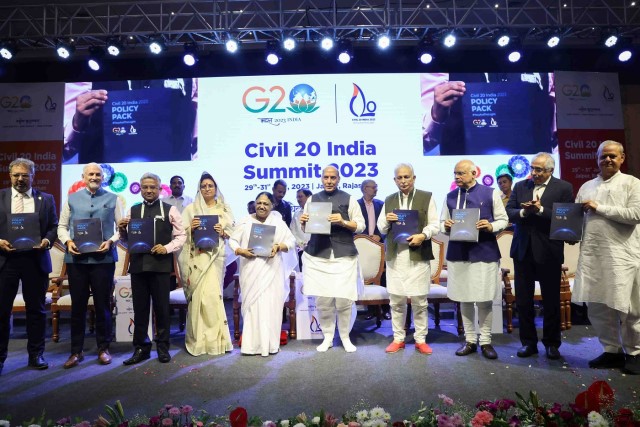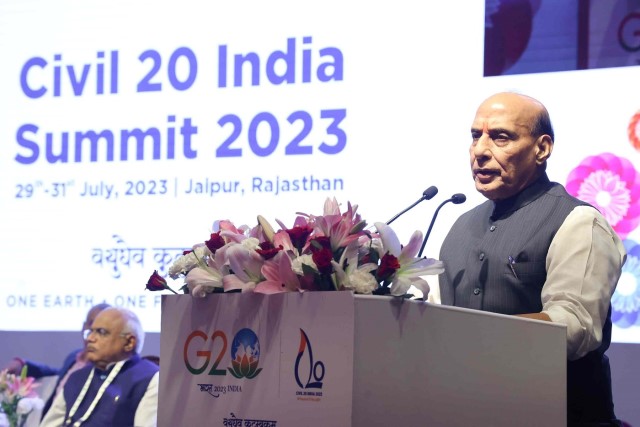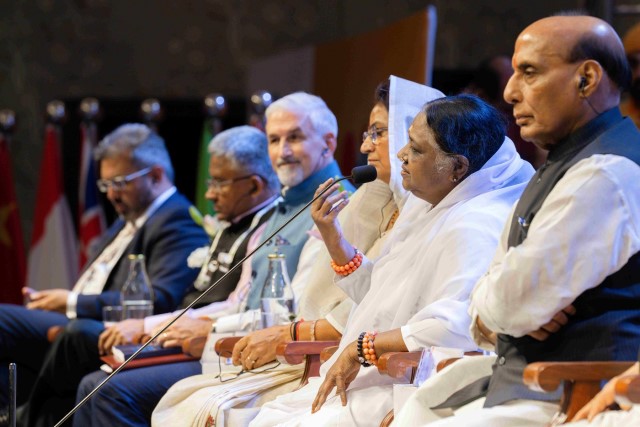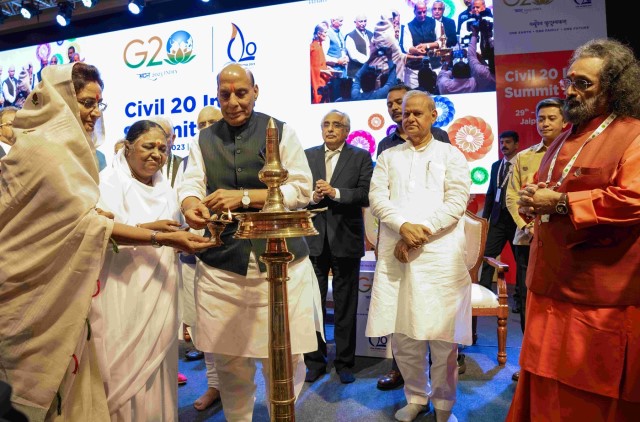- Shri Rajnath Singh, Hon’ble Minister of Defence, Govt. of India, graced the occasion with his presence, among other dignitaries
- The three-day event would present policy recommendations developed by 16 Working Groups of C20
JAIPUR: The Summit of Civil 20 (C20), one of the official Engagement Groups of the G20, has been inaugurated at Jaipur. More than 700 delegates from India and around the world are participating in the three-day event.
Dignitaries present during the inaugural ceremony included Shri Rajnath Singh, Hon’ble Minister of Defence, Govt. of India; Smt. Shakuntala Rawat, Hon’ble Minister of Industry, State Enterprises & Devasthan, Govt. of Rajasthan; Amma, Sri Mata Amritanandamayi Devi, Chair, C20; Sri M, Core Committee Member, C20; Shri Vijay Nambiar, Sherpa C20 India, Former UN Secretary General’s Special Advisor on Myanmar; and H.E. Mr. Federico Salas Lotfe, Ambassador, Embassy of Mexico; Swami Amritaswarupananda Puri, Troika, C20 & Vice Chairman Mata Amritanandamayi Math; Ms. Nivedita Bhide, C20 Core Committee; Shri Chandra Prakash Joshi, Member of Parliament; Sri Joginder Singh Awana, MLA; Shombi Sharp, UN Resident Coordinator; Dr. Vinay Sahasrabuddhe, Sous-sherpa C20 India; Shri Ah Maftuchan, Sherpa C20, Indonesia; Shri Niklaus Gugher, Member of the National Council (Switzerland); and Shri Abhay Thakur, G20 Sous Sherpa.
The main highlights of the Jaipur C20 summit are the release of the C20 Policy Pack and the C20 Communique — C20’s policy recommendations developed by 16 Working Groups after extensive discussions with civil society organizations and policymakers worldwide. These important documents will be handed over to the G20 Secretariat.

Addressing the delegates at the inaugural program, Shri Rajnath Singh, Hon’ble Minister of Defence, Govt. of India, said: “India assuming the presidency of G20 has presented us a historic opportunity to address global challenges through discussion and dialogue. Hopefully, we can also come up with a response to them. Based on the philosophy of Vasudhaiva Kutumbakam and worshipping various manifestations of nature, the Indian civilization doesn’t believe in ‘othering’ anyone based on parameters like race or religion. We have never seen others as different from ourselves. The ancient Indian concept of ‘as is the microcosm, so is the macrocosm’ has great significance in a world facing drastic climate change and environmental degradation due to mankind’s insatiable greed. The approach of ‘one world, one family’ provides a much better way to live our lives and design our socio-economic structures.”

Shri Rajnath Singh added: “Civil society organizations have been an intrinsic part of Indian history for thousands of years. They played a significant role in shaping the socio-cultural and political fabric of our society. While kings upheld the rule of law or dharma, civil society groups were instrumental in operationalizing their ideals in society. Structures like Buddhist Sanghas, merchant guilds, temples, and ashrams fostered a sense of unity and harmony among people and participated in social affairs, assisting the king in the business of governance. Civil society organizations are essential for the functioning of democracy as they enable citizens to engage in dialogue and cooperative efforts to achieve national objectives. They are not antithetical but complementary to the state apparatus. Many of the Indian Government’s landmark socio-economic initiatives have been supported by their herculean efforts.”
Shri Rajnath Singh added: “There is a healthy growth of civil society organizations across the globe, and they are positively impacting policy-making in various areas. Even though they complement the government, the functioning of the two is vastly different. The Government apparatus is more rigidly organized and institutionalized. It cannot act hastily on novel, untested ideas, otherwise, chaos and instability may injure the social well-being. This is where civil society groups can play a significant role due to their fluid, informal and nimble-footed structures which provide a huge scope for new ideas and processes to play out in society. Civil society organizations act as incubators for new practices which can be scaled up from the micro to macro level by the Government. We have many examples in this regard like the provision of mid-day meals to school students.”
He added: “Comparative advantages of civil society groups and traditional government structures can be harnessed for the overall progress of the society. The former can act as force multipliers for the government. Their efforts for the betterment of vulnerable groups have significantly altered the social and economic landscape of India in a very positive measure. There is no better example of this than Amma, Sri Mata Amritanandamayi Devi herself.”

Amma, Sri Mata Amritanandamayi Devi, Chair, C20 said, “On this momentous occasion, we, the C20 team—with all the 16 Working Groups—feel happy and content because we know we have done our part with utmost sincerity, love, and dedication. The team worked day in/day out to explore, gather the necessary information, research, polish, and finetune the grassroots-level problems of people. We conducted hundreds of conferences and events to create much-needed awareness. A total of 200,000 people from around the world participated in our online, hybrid, and physical discussions, seminars, and conferences. Perhaps, C20 India can claim credit for bringing in the largest number of participants and conferences in the history of C20 since its inception 10 years ago. Together with all the 16 Working Groups, we were able to create awareness about the need to embrace a more compassionate approach in all areas of life and were able to effortlessly incorporate the aspect of compassion into all its activities.”
Said Shri Vijay Nambiar, Sherpa C20 India, Former UN Secretary General’s Special Advisor on Myanmar: “During the past eight months, more than 1,000 meetings have been held across 60 cities in India and abroad under the aegis of C20, attended by over 184,000 people covering 74 nationalities. The 16 Working Groups of C20 have proposed a wide array of policy recommendations on each of their thematic areas. They have also come up with specific examples of successful work that has already been done by civil society organizations in each area of focus which could be replicated elsewhere in the world.”
He added: “Civil society organizations are both the bridge and the moral compass that transcend the state and prevent it from atomizing society. They enhance public accountability by making the state more responsive with more inclusive development policies through building a larger consensus on social goals. India has been highlighting the major issues facing the global community in the present fragile global environment. The C20 has also been playing a big role in this direction. The civil society calls on the UN and the G20 to take bold action, including through substantial financial commitments, to help achieve the critical Sustainable Development Goals. Civil society around the world should have sufficient space to play a fitting role in the implementation of this agenda.”
The G20 (Group of 20) is a forum comprising 19 countries and the European Union. It works to address major issues related to the global economy. C20 provides a platform for Civil Society Organizations (CSO) around the world to voice people’s aspirations to the world leaders in G20.
Amma, Sri Mata Amritanandamayi Devi, is the Chair of C20.


